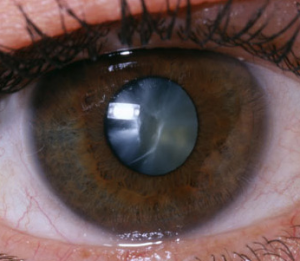Cataract Surgery
What is a cataract?
It is an opacity or clouding of the eyes natural lens. This filters the incoming light making images appear blurred or cloudy.
Cataracts usually develop in both eyes although not always at the same rate. The rate of progression varies from person to person.
What are the symptoms of cataract?
Gradual blurring of vision is the most common symptom. Other symptoms can include:
– glare, dazzle, change in colour perception, double vision (in the affected eye), increasing short sightedness and difficulty driving at night.
When should a cataract be treated?
The decision to proceed with cataract surgery is a personal one made in conjunction with your ophthalmologist. The timing of surgical intervention varies depending on how much the cataract is impairing your vision and affecting your lifestyle. Your visual acuity levels in relation to minimum driving standards are also a consideration.
What is cataract surgery?
Surgery involves removing the hazy natural lens and replacing it with a clear plastic lens implant. It is usually performed under topical anaesthetic +/- sedation.
Is the procedure done with a laser?
Traditionally, cataract surgery is done with a fine ultrasound probe which emulsifies and aspirates the lens. New laser technology is available which “pre-treats” the eye prior to proceeding with conventional surgery. This may make the procedure slightly more precise. The visual results are the same as traditional cataract surgery. Precision Eye Clinic surgeons are able to offer laser cataract surgery if requested, it does incur an out of pocket fee.
Will I need to wear glasses after the surgery?
The aim of cataract surgery is to improve vision. For many patients dependence on glasses is reduced following cataract surgery. Most patients opt to have their distance vision corrected and then use reading glasses for up close visual tasks.
What are the risks associated with cataract surgery?
Generally cataract surgery is very safe and gives good visual results in the majority of patients. As with any invasive surgical procedure complications can occur which may affect your vision.
Infection in the eye/endophthalmitis (1:1000 per operation)
Loss of lens material into the back of the eye (would require a second procedure).
Failure to achieve the desired refractive outcome (you may require spectacles to see perfectly in the distance)
Retinal detachment etc.
What does the procedure involve?
After admission to the day surgery centre, you will be introduced to your anaesthetist who may give you some “calming medication”. Eye drops will be inserted in the eye to be treated. You will then have the laser pre-treatment if you have elected to do so. You will then be escorted into the main theatre for the actual procedure which normally take 10-20 minutes.
The eye will have a patch on after the procedure which can be removed on waking the following morning.
Preoperative Assessment
At this assessment you will have both eyes dilated to allow your surgeon to perform a thorough examination. These dilating drops generally blur the vision for a few hours until they wear off, for this reason it is advisable to organise a driver or alternative transport. A pair of sunglasses will help reduce glare if it is a sunny day.
Measurements of your eyes will be taken to help determine the strength and type of lens implant. You and your surgeon will discuss the findings of your examination and lay out the options. This will include a discussion on the risks and benefits of cataract surgery. You or your accompanying family member/friend are free to ask questions.
If you decide to proceed you will complete a consent form and undergo financial consent. Please set aside 2 hours for the entire consultation.
If you wear contact lenses you should leave them out for at least one week prior to this assessment and also one week prior to surgery. This helps to improve the accuracy of our measurements in determining the strength of your lens implant.
More information
You may find useful information at the following website:
